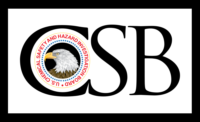A glass company that doesn’t allow employees to wear gloves. A fire disaster waiting to happen. A severe violator who had two workers drown in a trench.
These were among the employers named in this year’s “Dirty Dozen,” a list of nation’s worst safety offenders compiled annually by National COSH, a coalition health and safety organizations that advocate for the elimination of preventable hazards in the workplace.
The list’s release coincides with Workers Memorial Week (which runs through April 30) and comes just ahead of Workers’ Memorial Day, April 28. Both events honor workers who died on the job as well as those who suffered workplace injuries and illnesses.
“Every day in the United States, workers are getting hurt, getting sick and dying from preventable causes,” said Jessica Martinez, co-executive director of National COSH. “We know how to make our workplaces safer. We’re calling on these companies to implement effective health and safety programs including, which must include worker participation. These firms need to eliminate workplace hazards and take action so that every worker can return home safely at the end of his or her shift.”
The “Dirty Dozen” for 2017 are:
Atlantic Drain Services - Roslindale, MA
In a 2016 incident that sent shock waves through the Boston community, two workers drowned when a nearby water supply line broke, flooding the unprotected trench they were working in. “Their co-workers tried to dig through the mud to get to them,” said Jeff Newton of the Massachusetts Coalition for Occupational Safety and Health (MassCOSH). Newton said it took firefighters hours to extract the bodies from the trench. “One of them was found in a standing position, meaning he was almost instantly encased in earth.”
Atlantic Drain had already been labeled a Severe Violator by OSHA. The double fatality resulted in charges against the company and its owner being charged with two counts of manslaughter, misleading and investigator and concealment of records. If found guilty, the maximum penalty the company would face under a decades-old law is $6,000.
The Boston City Council subsequently passed an ordinance empowering the city to deny or revoke building permits from contractors who have repeatedly violated worker safety laws.
California Cartage - Long Beach, CA
The death of a driver; serious violations in GA and CA; lack of machine safeguards, faulty brakes and other hazards.
Dedicated TCS - Lansing, IL
Worker died inside a confined space; company cited three times for similar violations; $226,000 in OSHA fines.
Dollar General - Goodlettsville, TN
"A fire disaster waiting to happen," according to OSHA, which has hit the companies various locations with more than 00 citations and $1 million in fines for blocked exits. A former Labor Dept. official called for criminal prosecution.
Environmental Enterprises, Inc. - Spring Grove, OH
Worker killed in a chemical explosion; OSHA describes a “complete disregard for employee’s safety”; indictment for involuntary manslaughter and reckless homicide.
Fuyao Glass America - Dayton, OH
Workers exposed to broken glass without proper protection; 23 serious OSHA violations; extensive complaints from workers, who are exposed to risk of amputation.
Nissan USA - Franklin, TN
Five workers dead in five years; $99,000 in proposed OSHA fines; workers say they fear losing their jobs if they report injuries.
Pilgrim’s Pride - Greeley, Colorado
Death in a poultry processing plant; worker loses fingers because management “did nothing” to address amputation risk; exposure to toxic ammonia.
PrimeFlight - Nashville, Tennessee:
Exposure to blood borne pathogens; 22 OSHA violations in three years; OSHA cites conditions “likely to cause death or serious harm.”
TransAm Trucking - Olathe, Kansas
“Frozen Trucker” fired for protecting his own safety; company wages seven-year court battle; Worker wins $280K in back pay.
Samsung Seoul - South Korea
This company – whose products are popular with consumers in the U.S. – has allegedlyhad high rates of serious illnesses and fatalities among its workers due to exposure to toxic chemicals, although Samsung has refused to disclose information, claiming “trade secrets.”
Valley Garlic - Coalinga, CA
X-Treme AG - Kerman, CA
Four migrant workers died in the crash of an illegal transport van. Following a lawsuit by the U.S. Department of Labor, the contractor was enjoined from transporting agricultural workers.
“The dangerous conditions at these “Dirty Dozen” companies show why we need more enforcement of our safety laws, not less,” said Jordan Barab, former deputy assistant secretary for occupational safety and health at the U.S. Department of Labor. “Proposed budget cuts for OSHA and other safety agencies are penny wise and pound foolish. Preventing injuries, illnesses and fatalities in the workplace not only reduces a terrible toll of human suffering – it also saves billions of dollars for employers and taxpayers.”
Although Barab conceded that the Trump administration has taken a “different” approach to worker safety, he said regulations protecting workers still exist and enforcement is still taking place. He urged workers who find themselves exposed to workplace hazards to pick up the phone and call OSHA. “You have a right to a safe workplace no matter who the president is.”
Data presented in the “Dirty Dozen” report show that the decline in deaths from workplace trauma since the original Occupational Safety and Health Act was passed in 1970 are reducing costs to employers and taxpayers by over $200 billion a year. If workers were still dying at the rate experienced in 1970 – 18 per 100,000 full-time workers, as opposed to 3.4 per 100,000 in 2015 – the U.S. workforce would experience more than an additional 23,000 deaths per year. Each workplace death costs a projected $8.7 million in legal and medical expenses, lost productivity and other costs.
During the last two years, however, deaths from workplace trauma have increased significantly, from 4,585 deaths in 2013 to 4,836 deaths in 2015, demonstrating the urgent need for stronger and more effective safety measures. In addition, Latino/a workers continue to suffer a higher rate of workplace fatalities than other ethnic groups, with four deaths for every 100,000 full-time employees.
Intimidation by employers is a major obstacle to accurate reporting injuries and workplace safety hazards, making it more difficult to correct unsafe conditions. “At Nissan, I’ve seen workers hurt so bad they are crying, but they are afraid to report their injuries,” said Everlyn Cage, a former employee at Nissan USA in Canton, Mississippi. “They saw what happened to other workers and they are afraid of losing their jobs.”
Often when Nissan employees report an injury, said Cage, “managers just basically give them ibuprofen and send them back to the line.”
Cage suffered two serious spinal injuries during her 11-year-long employment with Nissan. After one injury, she notified her supervisor, who denied her request to be allowed to go to the company’s on-site clinic. She finished her shift and then drove herself to a hospital emergency room, where she had to honk the car horn to get help from a security guard because she was in too much pain to get out of the car and walk in unassisted.
Recommendations to make U.S. workplaces safer:
- Implementation of comprehensive workplace health and safety programs
- Ensuring all workers the right to freely organize
- Stronger protections for workers of color, immigrants, temporary workers and other vulnerable populations
- Thorough investigation of workplace safety and health incidents and stronger enforcement mechanisms to hold employers accountable and deter future violations.
The “Dirty Dozen 2017” report is available on the National COSH website here.
Workers Memorial Week infographics are available in English here and in Spanish here.
About National COSH
National COSH links the efforts of local worker health and safety coalitions in communities across the United States, advocating for elimination of preventable hazards in the workplace. For more information, please visit coshnetwork.org.



